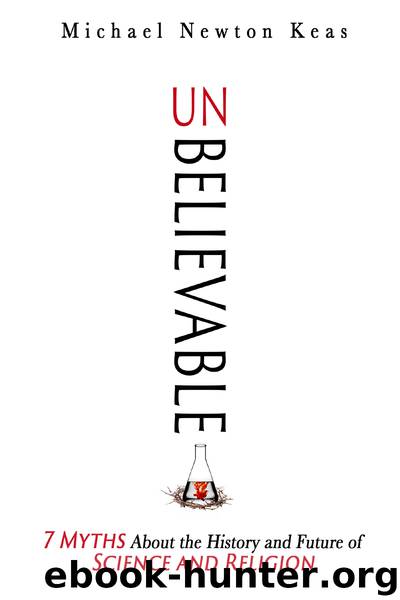Unbelievable by Michael Newton Keas

Author:Michael Newton Keas
Language: eng
Format: epub
Publisher: Intercollegiate Studies Institute (ORD)
Published: 2018-03-12T16:00:00+00:00
Sci-Fi and Today’s Search for ET-AI Enlightenment
The alleged demotion of humanity at the hands of Copernicus and Darwin could not restrain Wells and his followers from imagining a techno-scientific exalted humanity.33 In like manner, Arthur C. Clarke in 2001: A Space Odyssey introduced an ET-assisted and AIenhanced humanity. Unfortunately, some undesirable humans had to be destroyed along the way. ET’s technology appears magical, as the film illustrates powerfully with psychedelic hippie-generation special effects. Shockingly, this occult-like futuristic expectation pervades our culture’s current ET-AI enlightenment myth, as chapter 7 documented. Yesterday’s sci-fi has become today’s naturalistic ideology.
Many recent astronomers and SETI leaders, echoing the sci-fi of Wells and others, indulge in mythmaking that paradoxically demotes and exalts humanity—sometimes explicitly offering an ET-inspired spirituality without God. Such future-oriented myths build on the historical warfare myths about science and religion. They do so by claiming that we must lay aside past anti-science beliefs in the supernatural and replace them with a techno-scientific agenda for transforming humanity. Yet the envisioned future world will feel quite spiritual partly because of the magical wonders of scientific technology. We have seen how sci-fi provided the first reading of these subjects, thus shaping subsequent science and its associated anti-theistic myths.
In his space trilogy C. S. Lewis set out to reclaim sci-fi from this sort of Wellsian reconstruction of humanity—and along the way he anticipated some of the excesses of SETI and AI-Singularity ideology. Lewis reaffirmed the Christian roots of sci-fi that reach back to Kepler’s pro-Copernican, pro-ET space-travel dream. Kepler imagined life on other worlds without constructing a Wellsian godless demotion-promotion for humanity. The cosmic vision of Kepler or Wells—which shall it be, Passworthy? Which shall it be?
In chapter 10 we will become better acquainted with Kepler as one of the founders of modern science. In contrast to the warfare myths, his life and work illustrate the compatibility of Christianity and science. But to better recognize Kepler as a myth buster, we first need to venture into the world of televised cosmological storytelling. There we will find the TV documentary expression of futuristic sci-fi mythology. Like Wells, celebrity scientists end up finding religion in the attempt to escape it. Often this means that they develop an unconscious theology in the process of denouncing theology.34 There are, no doubt, many questionable TV preachers. The materialistic TV preachers that we will explore next do not beg for money; they want only your soul—naturalized and pulverized into stardust.
Download
This site does not store any files on its server. We only index and link to content provided by other sites. Please contact the content providers to delete copyright contents if any and email us, we'll remove relevant links or contents immediately.
The Lost Art of Listening by Michael P. Nichols(7485)
Why I Am Not A Calvinist by Dr. Peter S. Ruckman(4135)
The Rosicrucians by Christopher McIntosh(3506)
Wicca: a guide for the solitary practitioner by Scott Cunningham(3163)
Signature in the Cell: DNA and the Evidence for Intelligent Design by Stephen C. Meyer(3123)
Real Sex by Lauren F. Winner(3002)
The Holy Spirit by Billy Graham(2938)
To Light a Sacred Flame by Silver RavenWolf(2808)
The End of Faith by Sam Harris(2725)
The Gnostic Gospels by Pagels Elaine(2516)
Waking Up by Sam Harris(2448)
Nine Parts of Desire by Geraldine Brooks(2355)
Jesus by Paul Johnson(2349)
Devil, The by Almond Philip C(2323)
The God delusion by Richard Dawkins(2295)
Heavens on Earth by Michael Shermer(2272)
Kundalini by Gopi Krishna(2177)
Chosen by God by R. C. Sproul(2157)
The Nature of Consciousness by Rupert Spira(2086)
